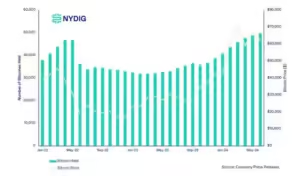U.S. Spot Bitcoin ETFs See $101 Million Net Inflows

Quick Take
- U.S. spot bitcoin ETFs experienced net inflows of $101 million on Wednesday.
- Fidelity’s FBTC led with $51 million in inflows.
- Other notable inflows included BlackRock’s IBIT, Bitwise’s BITB, and VanEck’s HODL.
Surge in Bitcoin ETF Inflows Reflects Market Optimism
The U.S. spot bitcoin exchange-traded funds (ETFs) witnessed a significant shift back to net inflows, accumulating $100.9 million on Wednesday. This comes after a brief period of net outflows on Monday and Tuesday, following a record-breaking 19-day streak of consistent inflows.
Fidelity’s FBTC spearheaded the inflows on Wednesday, drawing in $51 million. This was followed by BlackRock’s IBIT with $16 million, Bitwise’s BITB with $15 million, and VanEck’s HODL which added $12 million. Ark Invest’s ARKB also saw a positive inflow of $9 million. These figures were provided by SosoValue, a financial data firm.
ETF Performance and Market Trends
Grayscale’s GBTC, which has predominantly experienced net outflows since its conversion in January, reported no new flows on Wednesday. Similarly, funds from WisdomTree, Invesco, and other providers showed no movement. Despite this, the collective 11 bitcoin ETFs have amassed total net inflows of $15.52 billion since their inception.
Wednesday’s substantial inflows coincided with key economic indicators from the U.S. economy. The Labor Department’s consumer price index (CPI) for May showed no increase, suggesting a potential easing of inflation pressures. This economic data aligns with the Federal Open Market Committee’s decision to maintain the current interest rate between 5.25% and 5.50% after their Wednesday meeting, as reported by CNBC.
Economic Indicators and Market Reactions
The Federal Reserve’s stance on interest rates remains cautious. Despite no rate cut being implemented immediately, the Federal Reserve projected only one rate cut for 2024. This decision underscores the Fed’s assessment that the deflationary trend is not yet firmly established, according to a CNN report.
The interplay between economic indicators and market movements is crucial for understanding the trends in bitcoin ETF inflows. The anticipation of key economic numbers can significantly impact investor sentiment and market dynamics. The recent data suggesting a halt in inflation has likely contributed to renewed investor confidence, driving the inflows into bitcoin ETFs.
Fidelity Leads Inflows Amid Positive Economic Signals
Fidelity’s FBTC, with its leading $51 million inflow, reflects a strong investor trust in established financial institutions venturing into the cryptocurrency market. The performance of Fidelity’s ETF highlights the growing acceptance and integration of digital assets within traditional financial systems.
BlackRock’s IBIT and Bitwise’s BITB, with $16 million and $15 million inflows respectively, further demonstrate the diverse interest across different ETF offerings. VanEck’s HODL and Ark Invest’s ARKB also benefitted from the positive market sentiment, indicating broad-based interest in bitcoin ETFs.
Long-Term Outlook for Bitcoin ETFs
The cumulative net inflows of $15.52 billion since inception underscore the robust demand for bitcoin ETFs. These financial instruments provide a regulated and accessible avenue for investors to gain exposure to bitcoin, contributing to their popularity.
As the market evolves, the performance of bitcoin ETFs will likely be influenced by a combination of regulatory developments, economic indicators, and investor sentiment. The ability of these ETFs to attract significant inflows, even amid economic uncertainty, highlights their resilience and the growing confidence in digital assets.
Conclusion
The return to net inflows for U.S. spot bitcoin ETFs, with $101 million pouring in on Wednesday, marks a notable shift in investor sentiment. Led by Fidelity’s FBTC, the strong inflows across various ETFs indicate a renewed confidence in the cryptocurrency market. As economic indicators suggest a potential easing of inflation, the decision by the Federal Reserve to maintain current interest rates reflects a cautious approach to economic policy.
The long-term success of bitcoin ETFs will depend on their ability to navigate the evolving economic landscape and meet investor demand. With cumulative inflows surpassing $15 billion, these ETFs have established themselves as significant players in the financial markets, providing a gateway for mainstream investors to participate in the cryptocurrency revolution.



